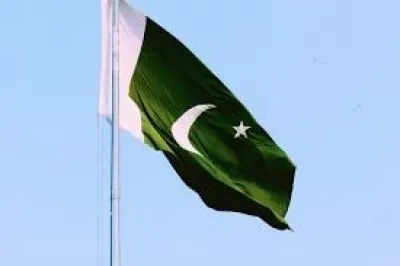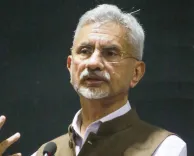How Did Pakistan’s Military Seize Control of the State?

Synopsis
Key Takeaways
- Pakistan's military has historically overshadowed civilian leadership.
- General Asim Munir's visit to the U.S. signifies military dominance.
- The nomination of Donald Trump raises concerns about military influence in diplomacy.
- Military rule can jeopardize Pakistan's democratic framework.
- Public engagement is crucial for restoring civilian governance.
New Delhi, June 29 (NationPress) The political arena of Pakistan has been largely manipulated not by its elected officials but by the shadowy influence of its military elite, whose control over the nation's future becomes more apparent with each passing event. The recent trip of General Asim Munir, the Army Chief of Pakistan, to the United States—notably without the Prime Minister—serves as a stark reminder of how extensively civilian power has been sidelined.
As if this were not enough of a signal, the bizarre nomination of Donald Trump for the Nobel Peace Prize by Pakistan further highlights the surreal and unaccountable hybrid regime currently in control of this nuclear-capable nation. In this ongoing saga, it is not the democratic will but the triad of Allah, America, and the Army that determines Pakistan’s destiny—a trio that has granted its generals unchecked power while extracting severe costs from the very populace they profess to protect.
It is well recognized that Pakistan’s military has consistently wielded excessive influence over matters of foreign policy, national security, and domestic governance. However, General Munir’s solitary diplomatic visit to Washington, devoid of the nation’s elected leader, signifies something even more alarming: the complete institutional sidelining of civilian authority.
In a functioning democracy, the Prime Minister represents the head of government, the key player in international diplomacy, and the voice of the populace on the global stage. Munir’s solitary appearance was not merely symbolic—it sent a clear message to both the international community and Pakistan’s own citizens: the Army is the primary agent of the state; the Prime Minister holds merely a ceremonial role.
This distorted rationale was further exposed through the bewildering act of nominating Donald Trump—a figure whose presidency was synonymous with chaos and division—for the Nobel Peace Prize. Even given Pakistan’s often murky and complex political practices, this gesture was puzzling.
Yet, viewed through the lens of military pragmatism, a grim rationale becomes apparent. Trump embodies a desire for transactional diplomacy, authoritarian leadership, and clandestine negotiations that sidestep democratic frameworks.
The military of Pakistan, which has historically thrived through bilateral dealings that diminish civilian leadership, sees in Trump a fitting counterpart—someone who communicates directly with generals rather than governments.
The nomination has little to do with peace or diplomacy. It is, instead, a calculated move—a political overture reaching from Rawalpindi to Mar-a-Lago.
More importantly, these developments reflect the underlying structure of Pakistan’s political system. The Defence Minister, Khawaja Asif, recently praised the so-called "hybrid system"—a euphemism for the military-civilian power dynamic that is far from balanced. In his own statements, he celebrated this Frankenstein construct as a viable model, revealing the tragic irony where elected officials not only accept their waning significance but actively support it.
One might anticipate such a structure to be imposed upon unwilling politicians. Yet, as a pointed tweet remarked: "It’s not that civilians have relinquished space... it’s that they have cheered on their own marginalization." This betrayal transcends institutional decay—it is a moral failure, a surrender of democratic integrity.
The tweet addresses the core of Pakistan’s political affliction. In any robust democracy, military overreach is met with civilian resistance, protest, and defiance. In Pakistan, however, civilians often extend the ladder. The PML-N, PPP, and even the once-principled PTI have each, at various points, prioritized short-term political gains by aligning with the military rather than upholding enduring democratic principles.
This complicity has weakened civilian authority, normalized coups without the necessity of tanks, and cultivated a political class more focused on maneuvering through corridors of power than on effective governance. A more recent tweet—"Allah, America, and Army have always been the dominant forces in Pakistani politics. While the generals have amassed power and wealth as a ‘front-line state’, the nation has suffered grievous losses. The Trump-Asim Munir meeting marks the death knell of civilian rule"—resembles a final elegy for Pakistan’s democratic aspirations.
This reveals the central paradox within the country’s strategic posture. Since the Cold War, Pakistan’s military has exploited its geopolitical location and strategic significance to garner substantial political power and attract foreign aid. The United States, in search of a reliable South Asian ally, repeatedly favored generals over institutions. This ongoing gamble, played out over decades, has enriched the military while leaving the nation impoverished—economically, politically, and morally.
The so-called front-line state designation evolved into a euphemism for enduring dependency. Pakistan’s military traded national sovereignty for security-related funding, yet these financial inflows rarely benefited the broader population.
Infrastructure deteriorated, education was sidelined, and healthcare systems collapsed. Meanwhile, the General Headquarters in Rawalpindi flourished—expanding housing projects, corporate ventures, and even political entities.
The repercussions of this Faustian bargain were not endured by the generals but by civilians—stripped of agency, stifled in dissent, and reduced to passive onlookers of their own governance.
Within this framework, General Asim Munir’s meeting with Donald Trump transcends a mere diplomatic engagement; it starkly highlights the fact that Pakistan’s military is now independently conducting foreign relations, free from parliamentary oversight or public accountability.
This is reminiscent of a state within a state—except the inner state no longer feels the need to operate in the shadows. It strides boldly into the White House, delivers public pronouncements, nominates foreign leaders for peace prizes, and orchestrates the installation, management, and removal of civilian administrations at will. And all of this occurs with the silent consent—at times, the enthusiastic endorsement—of those it has systematically rendered powerless.
Perhaps most troubling is the near-total absence of public outrage. The people of Pakistan have become so accustomed to military dominance that even the most blatant displays of authoritarianism elicit little more than apathy. A quiet fatalism permeates the national psyche—a collective acceptance of the belief that the Army will govern, irrespective of constitutional order.
Consequently, when a Defence Minister praises a hybrid regime, or an Army Chief assumes the diplomatic stage in Washington in the absence of the Prime Minister, it scarcely raises eyebrows. The line between the abnormal and the accepted has long since blurred. Yet this trajectory is ultimately unsustainable.
The military’s increasing consolidation of power is not merely politically damaging—it is strategically dangerous. No nation can endure indefinitely under the rule of its own armed forces.
The systematic degradation of civilian institutions, the ritualized subjugation of elected officials, and the economic prioritization of military interests do not constitute a recipe for national resilience. Instead, they serve as markers of institutional disintegration. Pakistan’s gravest threat is not external—it is internal: the entrenched militarism that refuses to recede, and a civilian leadership unwilling to resist.
While the generals may believe that another endorsement from Washington or the emergence of another transactional figure like Trump will solidify their dominance, history is not so easily misled.
Every short-term alliance with a foreign benefactor carries a long-term cost. American support is never eternal. Its interests do not align with the aspirations of Pakistan’s populace, but rather its own shifting geopolitical goals.
When those goals shift—as they inevitably will—the military risks finding itself in control of a nation stripped of legitimacy, lacking public trust, and increasingly sidelined on the international stage. It is not too late to change course. However, for such a redirection, Pakistan’s civilian leadership must rediscover its determination.
It must stop celebrating its own subjugation. It must confront an uncomfortable reality: a state ruled by generals is no democracy, and a populace living in fear is not free. Civilian leaders must challenge the myth that the military is the country’s only functional institution and instead commit to strengthening and legitimizing civilian governance.
Most crucially, they must reject the illusion that the Army and the people are synonymous. They are not. One is meant to serve the other—and so it must.
The Trump-Asim Munir episode may, in hindsight, be regarded as a pivotal moment—not because it changed the status quo, but because it laid it bare. It showcased a civilian government so weakened that it stood silently as its authority was usurped on foreign soil. It revealed a military so empowered that it no longer feels the need to uphold even the facade of democratic legitimacy.
And it exposed a political class so deeply complicit in its own disempowerment that it has come to view marginalization as a form of merit. This is not a hybrid arrangement. It is a hostage scenario. Tragically, Pakistan is rapidly running out of time to effect a rescue.







